YOUR NO 1 WOODWORKING POWER TOOLS RESOURCE WEBSITE
7 Best Alternatives to Table Saw for Small Wood Shops

Disclosure: If you click on some of the links, we may earn a small referral fee. Please know that we only recommend products that we use and believe will add value to our readers.
Table saws are a staple in many woodworking shops, but they can be bulky, expensive, and sometimes even dangerous. For small woodworking shops, it may not be feasible to have a table saw on hand. But don’t worry. There are many table saw alternatives that can provide similar functionality and results.
In this article, we’ll be exploring the seven best alternatives to table saw for small woodworking shops. We’ll examine each tool’s functionality, portability, ease of use, and safety and make recommendations based on specific needs and preferences. Whether you’re into cabinet making, furniture building, or just enjoy working with wood, there’s a power saw out there that can help you achieve your goals.
Related Article: 14 Essential Accessories To Maximize Your Table Saw’s Capability
Why The Need for a Table Saw Alternative
Table saws are powerful and versatile tools that allow woodworkers to make precise cuts, crosscuts, and rip cuts. Their popularity is due to the precision and speed they offer in cutting materials, which makes them a must-have tool in any woodshop.
However, table saws are not ideal for small woodshops, especially for those that lack space or budget. Table saws can be quite expensive, and their large size can be a hindrance for those with limited space.
Additionally, they can be dangerous to use, especially for beginners or those without proper training. These factors make it necessary to look for alternatives that are more accessible, affordable, and safe.
There are several options that are worth considering, each offering its own unique set of advantages and disadvantages.
The right choice is driven by several factors, including accessibility, affordability, and safety. Small woodshops can benefit from using tools such as miter saws, circular saws, jigsaws, or band saws. These tools offer the same cutting capabilities as table saws but with more convenience, affordability, and safety.
By choosing the right alternative to table saws, small woodshops can continue to produce high-quality work without having to compromise on safety, accessibility, or budget.
What to Look for in a Table Saw Alternative
If you’re looking for a more compact and affordable option, there are several alternatives available. Let’s explore the key features to look for when choosing a table saw alternative. By considering these factors, you’ll be able to find the right tool for your needs and budget.
Size
One of the most important factors to consider when choosing an alternative to a table saw is size. If you have limited space in your workshop, you’ll want to look for a tool that is compact and easy to store. A miter saw, circular saw or jigsaw can be an excellent choice in this case, as they are more compact and lighter than table saws.
Speed and Efficiency
The next factor to consider is speed and efficiency. When working with wood, you want a tool that will make quick, precise cuts without having to spend a lot of time adjusting it. A miter saw, for example, is great for making precise cuts at specific angles, while a circular saw is a great all-around tool for making rough cuts quickly.
Precision & Accuracy
Precision and accuracy are critical in woodworking, and choosing an alternative to a table saw that offers these features is essential. Miter saws and circular saws offer excellent precision and accuracy, but jigsaws may not be as precise. Band saws, on the other hand, are great for making precise cuts, but they may be slower than other alternatives.
Versatility
Another important factor to consider is versatility. You want a tool that can handle a variety of cutting tasks and be used for multiple projects. Miter saws, circular saws, and jigsaws are all versatile tools. Band saws, on the other hand, are more limited in the types of cuts they can make.
Safety
Safety should always be a top priority when working with wood. Some table saw alternatives, such as miter saws, can be dangerous if not used properly, while others, such as band saws, are safer to use. When choosing an alternative to a table saw, look for a tool that is easy to use, has safety features built-in, and is less likely to cause injury.
Here is a full list of safety precautions to take when using any power tool.
Cost
Finally, the cost is another factor to consider when choosing an alternative to a table saw. Miter saws, circular saws, and jigsaws can be less expensive than table saws, but band saws can be more expensive. Choose an alternative that fits your budget but also offers the features and capabilities you need to complete your projects.
When choosing an alternative to a table saw, it’s important to consider the above-mentioned factors. By considering these key features, you can choose an saw that meets your needs and helps you complete your projects with ease. Woodworking without a table saw is possible, but only if you choose the right alternative.
The 7 Best Alternatives to Table Saws for Small Woodworking Shops
Now, let’s get into the alternatives to table saw that are ideal for small woodworking shops in terms of functionality, portability, and ease of use.
1. Circular Saw

Circular saws are versatile tools that can be used for a variety of cuts, including crosscuts, rip cuts, and bevel cuts. They are lightweight and easy to use, making them a popular alternative to table saws for small woodworking shops. However, they may not be as precise as table saws, so it’s important to use a straight edge or guide to ensure straight cuts.
Circular saws are also portable and can be used on any flat surface, making them ideal for job site work. However, table saws have more advanced features, such as miter gauges and fence systems, for improved accuracy in cutting straight lines. Circular saws rely on the user’s skill to achieve the desired level of precision.
Related Articles:
2. Track Saw
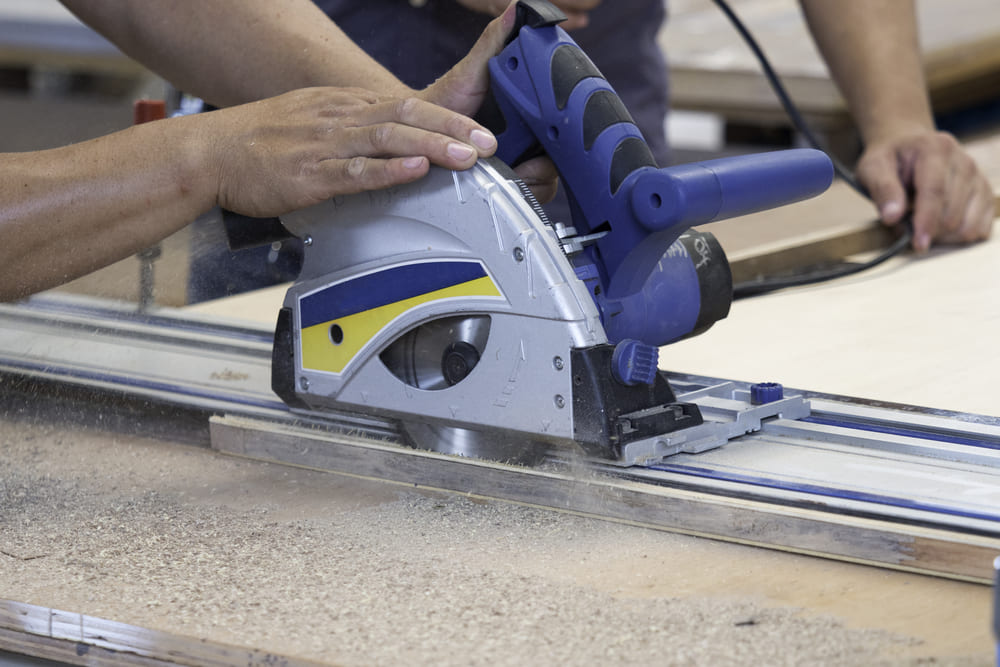
Track saws are similar to circular saws, but they have a special track that provides more stability and accuracy when making cuts. They are portable, easy to use, and can make precise cuts on the go. However, they may not be as versatile as circular saws and may not be suitable for all types of cuts.
Track saws are portable and can be used with a guide rail for improved accuracy. They are ideal for making long, straight cuts but may not have the cutting capacity of a table saw. However, track saws are lighter and more compact, making them easier to maneuver and store.
Related Articles
3. Jig Saw

Jigsaws are ideal for making curved and intricate cuts, making them a popular alternative to table saws for small woodworking shops. Some of the best jigsaws for woodworking include the Bosch JS470E, the DEWALT DW331K, and the Makita JV0600K.
Jigsaws are lightweight and easy to maneuver, making them ideal for curved cuts in tight spaces. Table saws require more setup and a dedicated workspace, but their larger size provides more stability and better control for straight cuts.
4. Band Saw
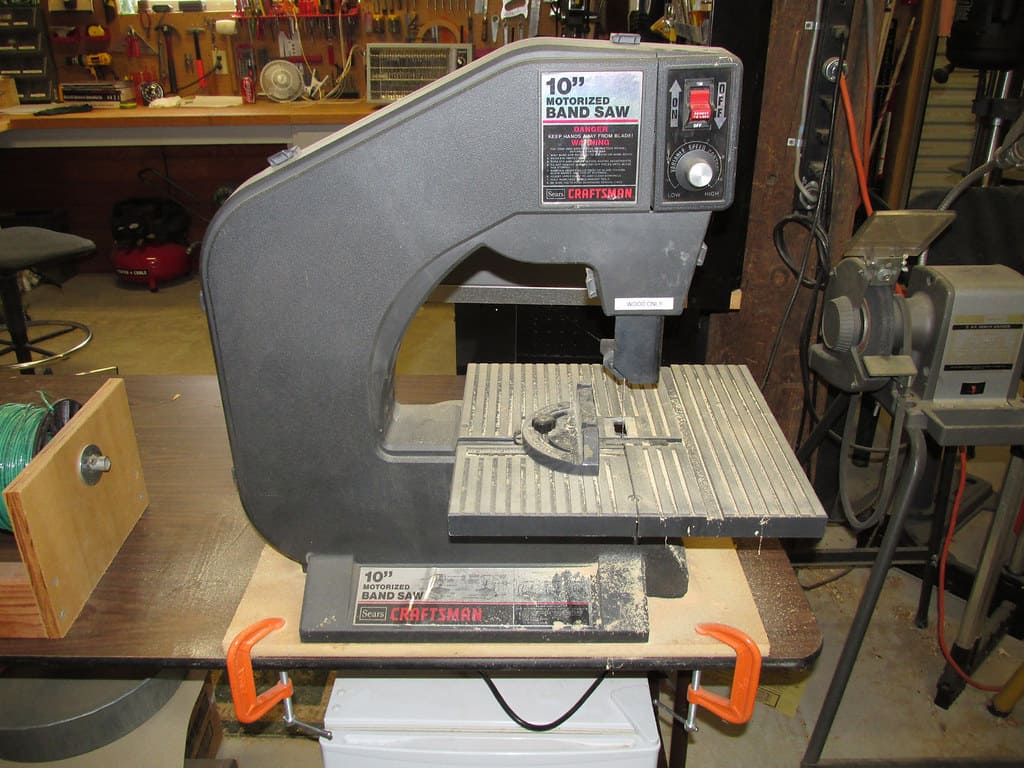
Band saws are ideal for making curved cuts, resawing, and cutting thick stock. They are a great alternative to table saws for small woodworking shops, as they are portable, lightweight, and easy to use. Band saws have a thin blade that provides improved accuracy in making curved cuts. Even though they require more setup and a dedicated workspace, the design provides better control. Some of the best portable band saws for woodworking include the DEWALT DCS371B and the WEN 3962.
Related Articles:
5. Miter Saw
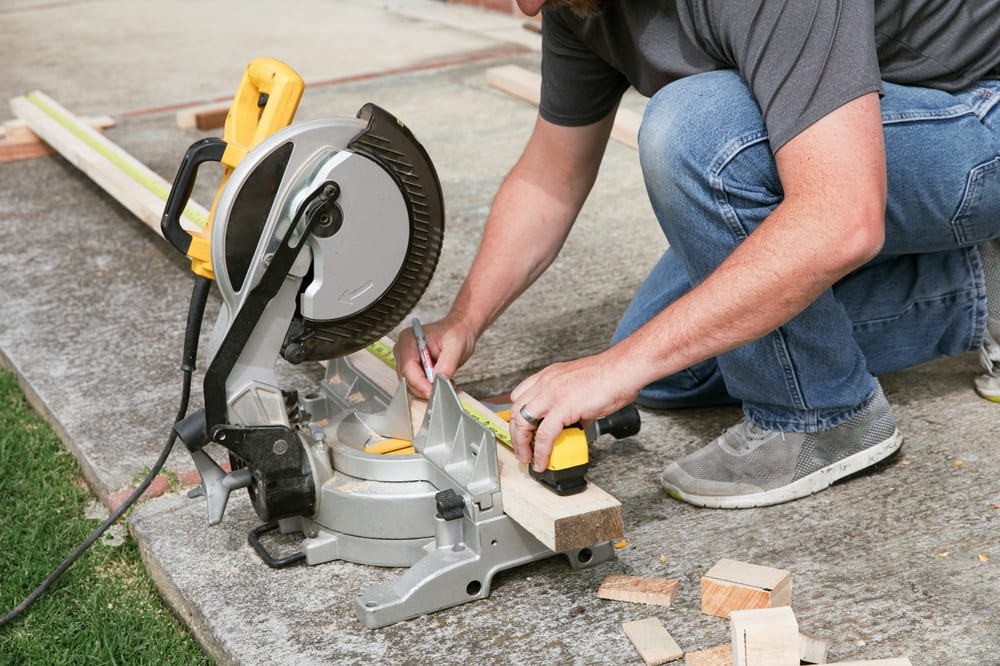
Miter saws are ideal for making precise crosscuts and angled cuts, making them a popular alternative to table saws for small woodworking shops. They are portable, lightweight, and easy to use, making them a great choice for those who need to make cuts on the go. Miter saws are also a great choice for those who are into cabinet making, as they are capable of making precise cuts quickly and efficiently.
Related Articles:
6. Radial Arm Saw
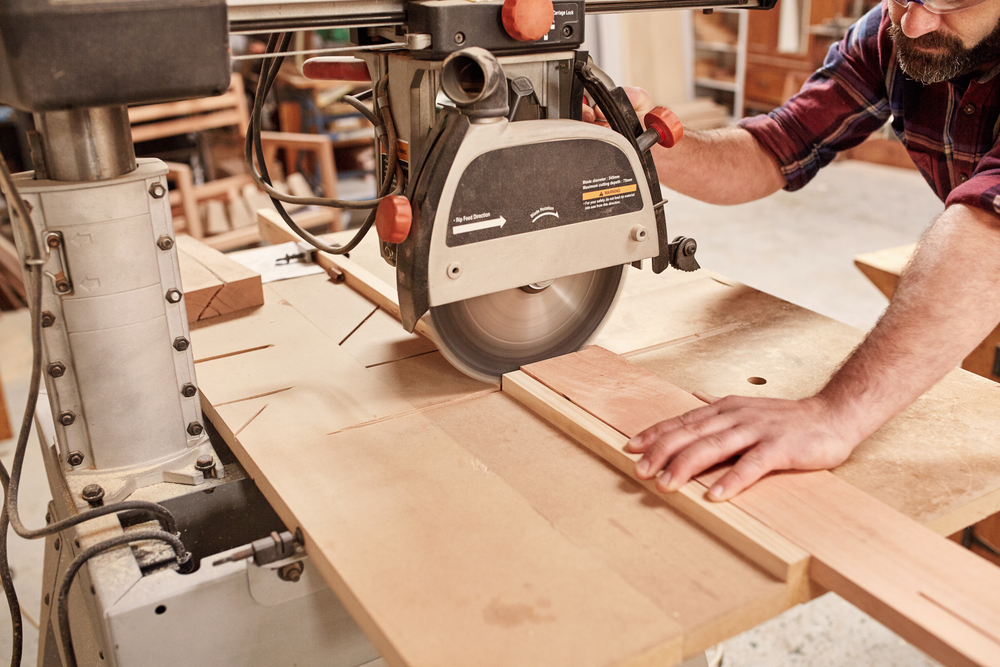
Radial arm saws are similar to table saws in terms of functionality, but they are a little bit more compact. They are ideal for making crosscuts, rip cuts, and bevel cuts and are a great alternative to table saws for small woodworking shops. However, they may not be as versatile as table saws and may not be suitable for all types of cuts.
Nowadays, radial arm saws are not being made or marketed to woodworkers anymore, leaving many to wonder whether they have gone extinct. We’ve clarified this in our article: Radial arm saws: are they obsolete?
7. Router
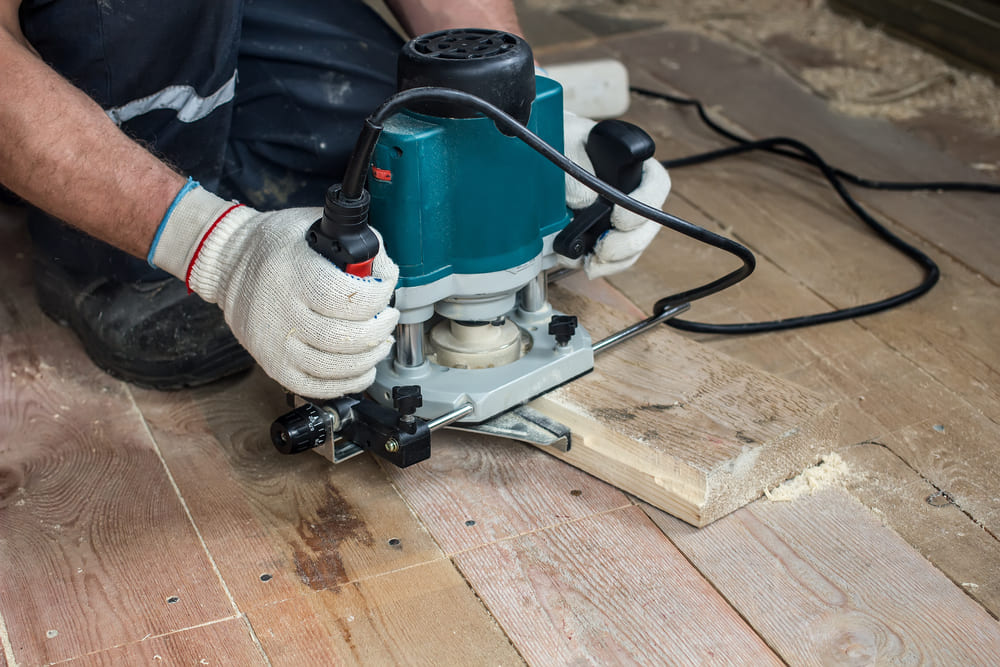
Routers are ideal for making decorative cuts, shaping, and hollowing out areas in wood. They are a great alternative to table saws for small woodworking shops, as they are portable, lightweight, and easy to use. Some of the best budget routers for woodworking include the DEWALT 20V MAX Cordless Router and the Makita RT0701C Compact Router.
Related article:
Bonus: Contractor/Jobsite Table Saws

Contractor/jobsite table saws are a type of table saw designed for on-site work, often for professionals in construction, woodworking, and carpentry. Compared to traditional table saws, contractor/jobsite saws are smaller in size and lighter in weight, making them more portable and easier to move from one job site to another. However, they do not compromise on power and accuracy, and they still have the capability to handle a variety of cutting tasks.
In terms of ease of use, they often have features such as quick-release rip fence and easy-to-read measurements, making them user-friendly and efficient. One example of a high-quality contractor/jobsite table saw is the Ridgid R4514, which has received positive reviews for its power, precision, and ease of use.
Frequently Asked Questions
Can I do woodworking without a table saw?
Yes, you can do woodworking without a table saw. There are many other tools that can be used for cutting and shaping wood. These include circular saws, jigsaws, miter saws, band saws, radial arm saws, and routers. These tools can provide similar functionality as a table saw but may not be as versatile or precise. It is important to choose the right tool for the job and to use proper techniques to ensure accurate and safe cuts.
Which one of the above is the safest alternative to a table saw?
It’s difficult to determine which is the safest as it depends on various factors. These factors include the skill level of the user, the type of cut being made, and the conditions in which the tool is being used. Remember to always put on proper safety gears before using any power tool.
How can I rip boards without a table saw?
Ripping boards without a table saw can be done by using a rip-cut fence and a circular saw. A rip-cut fence is a guide that attaches to a flat surface and helps guide the circular saw to make a straight cut. By using a rip-cut fence and a circular saw, you can easily make precise rip cuts without the need for a table saw.
Conclusion
There are many alternatives to table saw that can be used in small woodworking shops, each with its own advantages and disadvantages.
When choosing an alternative to a table saw, it’s important to consider factors such as functionality, portability, ease of use, and safety. In general, it is recommended to choose the right tool for your projects and to have a clear understanding of its capabilities and limitations.
Also, see our article on how to choose the right table saw blade for your wood projects.
Enjoy our articles? You can follow us on Pinterest for more woodworking power tools tips and tricks.
Save on selected power tools from top brands - Shop Now on Zoro.



